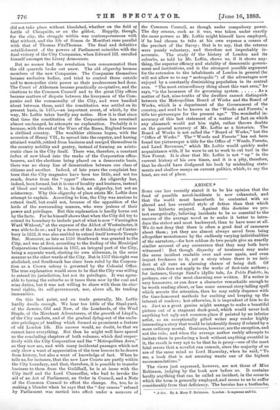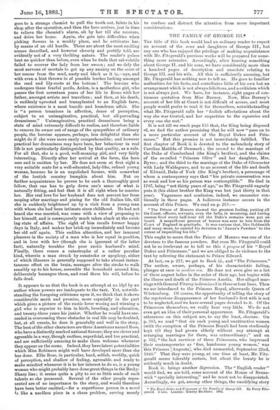ARDEN.*
SOME one has recently stated it to be his opinion that the fund of possible novel-incidents is now exhausted, and that the world must henceforth be contented with an altered and less eventful style of fiction than that which it has hitherto enjoyed. Against this doctrine we pro- test energetically, believing incidents to be eo essential to the success of the average novel as to make it better to intro- duce the stalest and most hackneyed, than to have none at all. We do not deny that there is often a good deal of sameness about them ; yet they are almost always saved from being altogether monotonous by the endlessly varying individualities of the narrators,—for how seldom do two people give an exactly similar account of any occurrence that they may both have witnessed ! But though diversity of treatment may make the same incident readable over and over again, and even impart freshness to it, yet a story where there is no inci- dent at all runs an alarming chance of being dull. Of course, this does not apply to the works of first-rate authors ; for instance, George Sand's idyllic tale, La Petite Fadette, is, perhaps, one of the most charming ever written. If a writer is very. humorous, or can draw a character remarkable enough to be worth reading about, or has some unusual story-telling spell which arrests the attention, then he may safely dispense with the time-honoured methods for exciting and keeping up the interest of readers ; but otherwise, it is imprudent of him to do so. Just as a great genius might manage to make a beautiful picture out of a stagnant duck-pond, which would never look anything but ugly and common-place if painted by an inferior artist, so an exceptionally gifted writer may render highly interesting a story that would be intolerably dreary if related by a more ordinary mortal. Geniuses, however, are the exception, and not the rule ; and when the average author rashly attempts to imitate them in producing a book without anything eventful in it, the result is very apt to be that he is prosy—one of the most fatal errors that a novelist can commit, since the majority of us are of the same mind as Lord Macaulay, when he said, "To me, a book that is not amusing wants one of the highest recommendations."
The views just expressed, however, are not those of Miss Robinson, judging by the book now before us. It contains hardly anything that can be called an incident, in the sense in which the term is generally employed, and seems to us to suffer considerably from that deficiency. The heroine has a toothache,
• Aram. By A. Mary F. Robinson. London : Longman ana Co.
goes to k strange chemist to pull the tooth out, faints in his shop after the operation, and then the hero arrives, just in time to relieve the chemist's alarm, sit by her till she recovers, and drive her home. Again, she gets into difficulties when picking flowers in a muddy place, and he extricates her, by means of an old hurdle. These are about the most exciting scenes described, and however cleverly and prettily told, are evidently not of a very thrilling nature. The reader's pulses beat no quicker than before, even when he finds that sal-volatile failed to recover the lady from her swoon ; and we defy the most nervous of mortals to get up any anxiety on the score of her rescue from the mud, nasty and black as it is,—aye, and with even a hint thrown in of possible leeches lurking amongst the reed and lily-roots at the bottom ! The heroine who undergoes these fearful perils, Arden, is a motherless girl, who passes the first seventeen years of her life in Rome with her father, amongst artists and travellers ; and then, at his death, is suddenly uprooted and transplanted to an English farm, where existence is a most bucolic and humdrum affair. She is "a person tenacious in affection, dense of perception, subject to an unimaginative, practical, but all-pervading dreaminess." Unimaginative, practical dreaminess being a state of mind extremely difficult to realise, and therefore liable to remove its owner out of range of the sympathies of ordinary people, the heroine appears, perhaps, less delightful than she might do if she were more easily comprehensible ; and however practical her dreaminess may have been, her behaviour in real life is not particularly distinguished by that quality, as a rule. For all that, she is a good, well-meaning girl, and very fairly interesting. Directly after her arrival at the farm, the hero sees and is smitten by her. He does not seem at first sight a very suitable mate for a well-educated, lady-like, refined young woman, because he is an unpolished farmer, with somewhat of the loutish country bumpkin about him. But on farther acquaintance he proves to be such a thoroughly good fellow, that one has to gulp down one's sense of what is naturally fitting, and feel that it is all right when he marries her. Her real love for her husband does not prevent her from moping after marriage and pining for the old Italian life, till she is suddenly brightened up by a visit from a young man with whom she had been intimate. since childhood. He had not heard she was married, was come with a view of proposing to her himself, and is consequently much taken aback at the exist- ing state of affairs. The sight of him recalls former happy days in Italy, and makes her brisk-up immediately and become her old self again. This sadden alteration, and her innocent pleasure in the society of a man who is her equal in position, and in love with her (though she is ignorant of the latter fact), naturally troubles the poor rustic husband's mind. Finally, there comes a catastrophe of a rather peculiar kind, wherein a man struck by sunstroke or apoplexy, either of which illnesses is generally supposed to take almost instan- taneous effect on the brain, manages after the stroke to walk sensibly up to his house, assemble the household around him, deliberately harangue them, and read them his will, before he falls dead.
It appears to us that the book is an attempt at an idyl by an author whose powers are inadequate to the task. Yet, notwith- standing the foregoing criticisms upon it, we think that it shows considerable merit and promise, more especially in the part which gives a picture of the rustic lover wooing and winning a girl who is superior to him in birth, breeding, and education, and twenty-three years his junior. Whether he would have suc- ceeded in overcoming these obstacles in real life may be doubted, but, at all events, he does it gracefully and well in the story. The best of tale other characters are three Americans named Rose, who have a distinctly marked national flavour; they are clever and agreeable in a way, though restless, superficial, and too practical, and are sufficiently amusing to make them welcome whenever they appear on the scene. Indeed, they have latent potentialities which Miss Robinson might well have developed more than she has done. Ellie Rose, in particular, hard, selfish, worldly, quick of perception, and shallow of feeling, agreeable, and ready to make mischief whenever it is to her interest to do so, is a young woman who might probably have done great things in the Becky- Sharp line ; it seems quite a pity to see so little made of such -talents as she possessed. Several of the other people repre- sented are of no importance to the story, and would therefore have been better omitted,—for a superfluous person in a novel is like a needless piece in a chess problem, serving merely
to confuse and distract the attention from more important considerations.



































 Previous page
Previous page